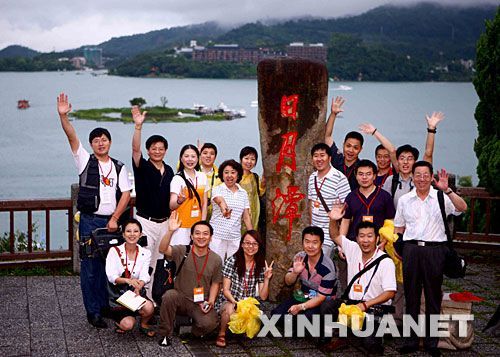
The passenger decline in the past few months is not just reflected by the number of those traveling on the ferry.
The Taiwan tourism sector — the first to face an immediate hit if cross-Straits relations turn sour — has seen a fall in the number of mainland Chinese tourists in general, with tour bus companies, hotels, restaurants and travel agencies complaining about the downturn.
Recent statistics released by the island's Tourism Bureau show that since the beginning of May, the number of mainland Chinese tourists traveling in groups dropped on a daily average by about 33 percent — or 1,650 people from the 5,000 recorded over the same period last year.
Robert Huang, a Taipei travel agent providing tours for Chinese mainland tourists, said these visitors accounted for a quarter of the 10.44 million tourists visiting Taiwan last year.
The 4.1 million tourists from the Chinese mainland last year alone contributed revenue of NT$20 billion ($612.4 million) to local tourism and related sectors, Huang said.
"Earlier this month, the number of these visitors during the May Day holiday dropped sharply," Huang said. "I am afraid there will be a further drop after Tsai is sworn in."
Figures from immigration authorities in Taiwan show that although 4,736 mainland tourists traveled to Taiwan on May 1, the number fell to 4,171 on May 2 and further decreased to 2,868 on May 3 and 2,930 on May 4.
This represented lost business income of $5.5 million compared with the same period last year.
"Tour bus operators have been the hardest hit, as many of them bought new buses to meet the rising demand during the tourism boom over the past eight years of cross-Straits rapprochement," said Tien, the Taiwan Travel Industry Association chairman.
"A number of these operators still have to pay for loans, in some cases up to NT$1 million a month, for the new buses," Tien added
Chiang Chi-hsing, honorary chairman of the Kaohsiung City Tour Bus Association, said that with slightly more than 4 million visits made by Chinese mainland tourists in Taiwan last year, at least 6,000 tour buses were needed to carry them.
"The new government has said we can explore other sources of visitors from Southeast Asia or elsewhere, but what it said is highly unprofessional," Chiang said, adding that Taiwan has long tried to bring in more people from these areas but with little success.
"We don't have enough tour guides able to speak fluent Vietnamese, Thai," or other languages, and "we don't have the necessary software and facilities to entertain those visitors," Chiang added.
Huang said his company has expanded its business to Europe and the United States in the past year, mindful of a possible change in cross-Strait relations if the DPP took power.
"It is OK with us as we made our move fast, but for those who mostly rely on Chinese mainland tourists, it will be a difficult time."
Meanwhile, hotels and restaurants relying on mainland tourists have also reported a drop of 20 to 30 percent in business.
Tien predicted that a number of such operations might have to shut down if cross-Straits relations turn sour. "Our economy is tipped to suffer if the situation worsens," he said.
In April, China Eastern Airlines suspended its flights from Taichung to Wuhan, which had been in operation for three years.
The company did not elaborate on why it halted the flights; nor did it say when they will be resumed.
Justin Mo, a Taiwan resident who owns a duty-free shop in Pingtan, told China Daily that friends who own hotels and restaurants in Taiwan all reported a decrease in customers recently.
"Their businesses all dropped by 20 to 40 percent last month," he said.
Statistics from the China National Tourism Administration show that 4.1 million people from the Chinese mainland traveled to Taiwan last year, accounting for about 40 percent of the island's total number of tourists. On average, each mainland tourist spent NT$7,770 in Taiwan each day.
Zhang Siwei, the tourism manager, said that he is paying close attention to Tsai's remarks on the cross-Straits relationship.
"If she holds a negative attitude toward developing mainland-Taiwan ties, my company's business will suffer," he said.




















































